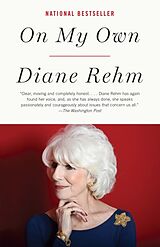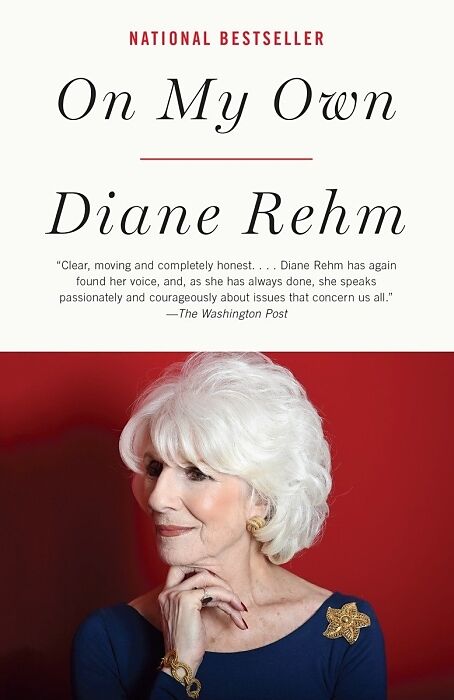On My Own
Einband:
Kartonierter Einband
EAN:
9781101973646
Untertitel:
A Memoir
Genre:
Briefe & Biografien
Autor:
Diane Rehm
Herausgeber:
Random House N.Y.
Anzahl Seiten:
176
Erscheinungsdatum:
07.02.2017
ISBN:
978-1-101-97364-6
In an eloquent, deeply personal and moving book, beloved NPR radio host Diane Rehm speaks about the death of her husband of fifty-four years--and of her struggle to reconstruct her life without him. John Rehm was 74 when he was diagnosed with Parkinson's. Nine years later, he passed away, having made the difficult choice to end his extended illness by refusing to eat, drink, or accept medication. This process transformed Diane into an advocate for increased conversation end-of-life care and the right to die on one’s own terms, as well as a brave and sympathetic voice for anyone who must learn how to live again after bereavement.
“Clear, moving and completely honest. . . . Diane Rehm has again found her voice, and, as she has always done, she speaks passionately and courageously about issues that concern us all.” —The Washington Post
“Rehm doesn’t have all the answers, nor does she pretend to. What she does have, as always, is a flurry of important questions, perfectly considered and potently posed.” —USA Today
“Poignant.”—The Miami Herald
“A plainspoken . . . passionate account . . . of [Rehm’s] journey through the first year of widowhood…. Eschewing self-help clichés … Rehm offers a meticulous narrative of her personal struggle to come to terms with a profound loss.” —BookPage
“Will invite comparisons to Joan Didion’s own memoir of loss, The Year of Magical Thinking.” —The Guardian (London)
“[A] clearheaded yet emotional call for national right-to-die laws.” —The Washington City Paper
“Rehm writes eloquently about the changing landscape of grief, not only her own sorrow but that of friends.” —The Kansas City Star
“Brave and uplifting.” —Kirkus Reviews
“Walks readers through the most recent year of [Rehm’s] life, struggling with living alone and figuring out a new identity.” —Philadelphia Inquirer
Autorentext
DIANE REHM hosted The Diane Rehm Show on WAMU 88.5 FM in Washington, D.C.—distributed by NPR—from 1979 to 2016, when it had a weekly listening audience of two and a half million. She lives in Washington, D.C.
Zusammenfassung
A beloved NPR radio host speaks about the death of her husband of fifty-four years—and of her struggle to reconstruct her life without him—in an eloquent, deeply moving book that “invite[s] comparisons to Joan Didion’s own memoir of loss, The Year of Magical Thinking” (The Guardian).
John Rehm was 74 when he was diagnosed with Parkinson's. Nine years later, he passed away, having made the difficult choice to end his extended illness by refusing to eat, drink, or accept medication. This process transformed Diane into an advocate for increased conversation end-of-life care and the right to die on one’s own terms, as well as a brave and sympathetic voice for anyone who must learn how to live again after bereavement.
Leseprobe
On June 14, 2014, my husband, John Rehm—age eighty-three—began his withdrawal from life. The aides at Brighton Gardens were instructed to stop bringing medications, menus, or water. His decision to die came after a long and difficult conversation the day before with Dr. Roy Fried, his primary physician; our son, David; our daughter, Jennifer, who was on the phone from Boston; and me.
John declared to Dr. Fried that because Parkinson’s disease had so affected him that he no longer had the use of his hands, arms, or legs, because he could no longer stand, walk, eat, bathe, or in any way care for himself on his own, he was now ready to die. He said that he understood the disease was progressing, taking him further and further into incapacity, with no hope of improvement. Therefore, he wanted to end his life.
Clearly, his expectation—and his misunderstanding—was that, now that he had made his decision, he could simply be “put to sleep” immediately, with medication. When Dr. Fried explained that he was unable to carry out John’s wishes, that he was prohibited from committing such an act in the state of Maryland, John became very angry. He said, “I feel betrayed.” Tears came into his eyes, tears of frustration and disappointment. Here was a man who had lived his life able, for the most part, to take charge of events, to be certain that his well-considered decisions would be carried out. And now he was making the ultimate decision, and having it thwarted.
It was then that Dr. Fried explained that the only alternative John had, if he truly wished to die, was to stop eating, drinking fluids, or taking medications. In other words, he could bring his life to an end through those means, but no one could do it for him. Dr. Fried added that he hoped John would not make the decision to end his life, but that, if he did so, as his physician he would honor it.
My husband had moved into assisted living at Brighton Gardens in Chevy Chase, Maryland, in November 2012, because he could no longer stand or walk without falling, or care for himself without assistance. We’d spent months talking about the decision we both knew was coming. We went over and over various possibilities, such as having someone move into our apartment to care for him on a twenty-four-hour basis, but we knew that wouldn’t work: there was simply not enough room for another human to be here full-time.
Most days I spent part of the afternoon with John at Brighton Gardens. Sometimes we’d sit silently, particularly in the weeks immediately after he moved in. Although he never admitted feeling resentful, it was clear he was unhappy. He had a private room, but was now in an institution, in the company of strangers, eating foods he didn’t care for in a large communal dining room, and feeling an extreme loss of privacy. But slowly he regained his sense of humor, his interest in world events, and his happiness each time I walked through the door.
Over the years, John and I had talked many times about how we wanted to die. We had promised that we would do everything we could to support each other’s wishes in the face of debilitating and unalterable conditions. Yet here I was, helpless to keep my promise. I could do nothing but listen as he railed against a medical and judicial system that prohibited a doctor from helping him die, even knowing that what awaited him was prolonged misery, further decline, and, to his mind, loss of dignity.
So John did what I dreaded, but knew in my heart he would do: he declared he would stop eating, drinking, or taking medications. He asked Dr. Fried how long the process of dying would last and was told it could be ten days to two weeks. John wanted to know, “Will I be in pain?” “Absolutely not,” responded Dr. Fried. “I promise you, you will be kept comfortable.”
A few months before this, John had come down with what’s so often been called the old man’s blessing. I was in South America, on a cruise with NPR listeners. It was a Saturday evening in March, and before I went to join the group for dinner, I called Brighton Gardens to check in. Our dear friends David and Mary Beth Busby were there with John, and Mary Beth answered the phone. When I asked how John was, she said, to my shock, “He’s not responsive.” I wasn’t sure I was hearing correctly. …

Leider konnten wir für diesen Artikel keine Preise ermitteln ...
billigbuch.ch sucht jetzt für Sie die besten Angebote ...
Die aktuellen Verkaufspreise von 6 Onlineshops werden in Realtime abgefragt.
Sie können das gewünschte Produkt anschliessend direkt beim Anbieter Ihrer Wahl bestellen.
Loading...
Die aktuellen Verkaufspreise von 6 Onlineshops werden in Realtime abgefragt.
Sie können das gewünschte Produkt anschliessend direkt beim Anbieter Ihrer Wahl bestellen.
| # | Onlineshop | Preis CHF | Versand CHF | Total CHF | ||
|---|---|---|---|---|---|---|
| 1 | Seller | 0.00 | 0.00 | 0.00 |
